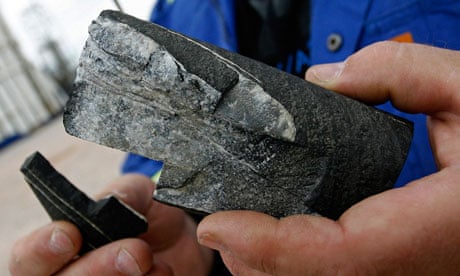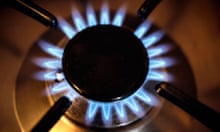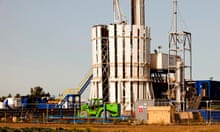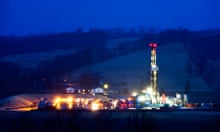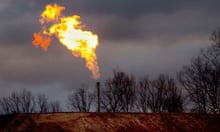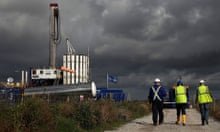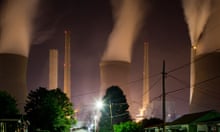What are shale gas and fracking?
- Shale gas is natural gas trapped in rocks deep underground
- It's extracted by "fracking": pumping water, sand and chemicals into the rocks
- Concerns have been raised about pollution, climate change and safety impacts
Shale gas is natural gas stored deep underground in fine-grained sedimentary rocks. It can be extracted using a process known as hydraulic fracturing – or "fracking" – which involves drilling long horizontal wells in shale rocks more than a kilometre below the surface. Massive quantities of water, sand and chemicals are pumped into the wells at high pressure. This opens up fissures in the shale, which are held open by the sand, enabling the trapped gas to escape to the surface for collection (see graphic).
Advocates argue that exploiting the world's potentially vast shale gas deposits will help keep energy affordable and cut consumption of dirtier coal. But sceptics claim fracking is dangerous and polluting, and that tapping into extra natural gas supplies will boost rather than reduce planet-warming carbon emissions.
Fracking is a nightmare! Toxic and radioactive water pollution. Tap water you can set on fire. Earthquakes. Runaway climate change. To produce expensive gas that will soon run out.
Campaign group Frack Off
Shale has changed the equation. Abundant, relatively low-priced supplies now make natural gas a highly competitive alternative to both nuclear and wind power and even to coal generation. It has the added advantage of being relatively low-carbon.
Energy commentator Daniel Yergin
What's the current situation?
- Shale gas production is rising quickly in the US
- Fracking has begun in the UK, Australia, China and other nations
- France and Bulgaria have banned fracking amid concerns
In the US, shale gas has scaled up rapidly to account for around a quarter of the country's natural gas extraction. Fracking is also now underway in many other countries, including China, Poland and the UK, where drilling company Cuadrilla Resources claims to have found vast reserves at its site near Blackpool.
But as fracking sites have multiplied so have the controversies. A 2010 film showed people near one US site setting tap water on fire and in 2012 a whistleblower claimed fracking could poison New York's drinking water. Meanwhile, Cuadrilla's UK operation was put on hold after causing tremors (tiny earthquakes), but a report by the UK government's advisers published in April 2012 gave the green light to fracking despite acknolwedging the link between the process and 2011's earthquakes.
Such concerns have seen France and Bulgaria ban fracking and campaigners are calling for other countries and US states to follow suit. But Australia recently gave fracking the go-ahead.
What's the background?
- Shale gas is one of various unconventional fossil fuels
- Extraction technologies were developed in the US since the 1970s
- Rising American production has driven interest in other countries
Shale gas was formed hundreds of millions of years ago from decomposing plants trapped by clay and silt. Like coal-bed methane and oil from tar sands, it's considered an 'unconventional' fossil fuel. A small amount of easily accessible shale gas was extracted in the 19th century, but it wasn't until the 1970s that shale gas technology started to develop in earnest, supported by US government R&D funding.
Breakthroughs in horizontal drilling techniques combined with developments in fracking technology (which is also used for some other energy sources) gradually increased the economic feasibility of shale gas and American production started soaring in around 2005. This – combined with rising energy prices and increasingly vast estimates of global reserves – lead to growing interest in the energy source around the world.
Is fracking safe?
- Shale gas extraction has been linked to water pollution in some cases
- Independent enquiries suggest these risks could be overcome
- Other problems include earth tremors and explosions
The most high-profile controversy surrounding shale gas is the potential for fracking to contaminate drinking water with methane or drilling chemicals. This link has been acknowledged by the US Environmental Protection Agency in the case of one Wyoming community, though recent reports from the University of Texas report and a UK Select Committee concluded that that fracking for shale gas wasn't inherently worse for groundwater than conventional oil and gas drilling, and that risks could be mitigated by better drilling practices.
However, both reports highlighted other issues, such as the huge quantities of water and chemicals (many of them toxic) used in shale gas extraction and amount of wastewater generated. Other concerns include tremors; emissions of explosive and climate-warming methane; and the impact of clearing forests for fracking sites. The industry claims the risks are small but campaigners are calling for a moratorium on fracking.
Let me be clear: hydraulic fracturing as it's practised today will contaminate our aquifers. Not might contaminate our aquifers. Hydraulic fracturing will contaminate New York's aquifers.
Paul Hetzler, ex-staffer at an agency responsible for regulating fracking
In the US, it is possible that bad practice by a very small number of operators may have led to some isolated and short-term incidents of natural gas contaminating water. However, these practices are the exception out of the hundreds of thousands of producing wells.
Cuadrilla Resources
Is shale gas good or bad for climate change?
- Gas produces CO2 when burned but less than coal or oil
- The industry claims shale gas could therefore reduce emissions
- Green groups say shale gas may be as bad as coal
Creating heat or electricity by burning natural gas produces less CO2 and other pollutants than using coal or oil. Hence the gas industry argues that shale gas is good news for the climate, as it could limit coal consumption while renewables and nuclear are scaling up. Indeed, insiders say the US government's plan for reducing carbon emissions relies heavily on switching from coal to fracked natural gas.
However, some studies – though not others – have suggested that shale gas may be no better than coal due to large-scale leaks of the powerful greenhouse gas methane at fracking sites. The Select Committee enquiry claimed these leaks could be avoided but green groups point out that even if this turns out to be true, there's no guarantee that extra gas supplies will reduce global coal use. A recent Tyndall Centre report concluded that, without a global carbon cap, additional gas would most likely add to overall fossil fuel use, driving emissions higher and making climate change harder to solve.
Increased reliance on gas in the near term saves money and jobs, delivers on climate targets and allows new technologies to be improved before large scale deployment.
David Rimmer, Shell's general managed for global gas
At the global level … where there is currently no carbon constraint, the exploitation of shale gas will most likely lead to increased energy use and increased emissions.
The Tyndall Centre for Climate Change Research
How significant is shale gas?
- Reserves may be huge though experts disagree on the details
- The US expects shale to provide nearly half its natural gas by 2035
- Extraction is likely to be much slower in densely populated Europe
Estimates of shale gas reserves vary widely. A US government assessment of 32 countries claimed they had 169 trillion cubic metres of technically recoverable shale gas – around the same as the world's economically recoverable reserves of conventional natural gas. The survey put the largest reserves in China, the US, Argentina and Mexico (see map). But the estimates keep changing. The official figure for the US was almost halved in early 2012, while Cuadrilla claims that its Blackpool site alone has 5 trillion cubic meters – ten times more than the US estimate for the whole UK. Similarly, China's own survey put its reserves nearly twice as high as the figure given in the US survey.
Whatever the size of the reserves, actual rates of extraction in each region will depend on economics and politics as well as technology. The US government expects shale gas to account for 46% of its natural gas extraction by 2035 and according to BP shale gas – along with tar sands and other unconventional fuels – will make the Americas largely self-sufficient in energy by 2030. By contrast, a Deutsche Bank report looking at the potential for shale in Europe concluded that there would be no 'shale gas revolution' there, due to factors such as higher population density and stronger environmental regulation.
There is now so much potential gas that for policy purposes it is better to assume that supplies have the potential to exceed demand … for the rest of the century.
Dieter Helm, Oxford energy academic
Those waiting for a shale gas 'revolution' outside the US will likely be disappointed, in terms of both price and the speed at which high-volume production can be achieved.
Deustche Bank
Some key players
- Cuadrilla Resources: the first company to frack for shale gas in the UK, which has put its Lancashire operation on hold but it is fiercely resisting a moratorium of fracking
- The EPA: the US Environmental Protection Agency which has acknowledged the link to pollution but so far done very little to regulate American fracking
- Josh Fox: director of Gaslands, a 2010 documentary which boosted awareness of the risks of fracking
- Frack Off: the campaign group leading the charge against fracking in the UK
- Dieter Helm: an Oxford energy academic who advocates using gas to cheaply cut emissions
- Charles Hendry: UK energy minister who says shale gas is "worth exploring"
- Barack Obama: insiders says the US administration hopes to rely on switching from coal to gas as its nod to global carbon reductions
Further reading
- Latest news and comment on shale gas and fracking from theguardian.com
- 2011 reserves estimates by the US Energy Information Administration
- Environmental and climate change impacts of shale gas – critical report on shale gas impacts by the Tyndall Centre
- Energy and Climate Select Committee report – detailed assessment of the issues for the UK
- Separating fact from fiction in shale gas development – report from academics at the University of Texas which supports fracking but highlights bad practice
- US Department of Energy shale gas guide including information on history and technology
